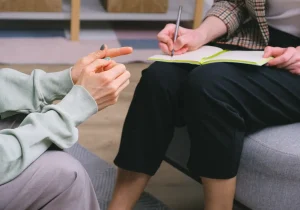We look at the benefits of CBT and how it differs from other treatments that focus on mental health and addiction.
How CBT Can Help You
Cognitive behavioural therapy is utilised extensively today in addiction treatment. CBT helps those in treatment to seek out patterns between their thoughts, feelings, and actions and raise awareness of how these aspects influence their decision making.
Along with addiction, CBT also treats co-occurring disorders such as:
- Attention Deficit Hyperactivity Disorder (ADHD)
- Obsessive Compulsive Disorder (OCD)
- Eating Disorders
- Post-Traumatic Stress Disorder (PTSD)
- Depression and/or Anxiety
Cognitive behavioural therapy helps to highlight damaging actions and emotions that are unhelpful and irrational. These states of mind and behaviours may originate from past experiences or environmental influences.
When a dependent person recognises why they feel or act a particular way — and the way those emotions and actions result in addictive patterns of behaviour — they are more efficiently equipped to beat their addiction and prevent relapse in the future.


Cognitive behavioural therapists assist those in recovery to spot their negative “automatic thoughts”. An involuntary thought relies on impulse and infrequently stems from misapprehensions and co-opted feelings of self-doubt and anxiety. In many cases, individuals try and self-medicate through hurtful thoughts and feelings by drinking alcohol or abusing drugs.
Over time, as the individual continues to question the negative narrative they create about themselves, the mind adapts to more positive states of awareness and thought processes, through a process called neuroplasticity.
Involuntary adverse thoughts are often a source for depression and anxiety disorders, which are shared co-occurring disorders with addiction. This suggests that negative, automatic thoughts can make someone more likely to abuse drugs and alcohol.
Cognitive behavioural therapists use detailed methods to assist in addiction recovery.
Examples of CBT techniques used in addiction treatment include:
- Thought Recordings
Those in treatment can observe involuntary negative feelings and search for objective evidence backing up and refuting those thoughts. They list signs for and against their involuntary thoughts to match and differentiate between them. The aim here, is to assist them in thinking about more balanced and less unforgiving feelings by critically assessing what they are thinking about. - Behavioural Experiments
These activities weigh the negative thoughts against the positive ones to determine which is simpler in altering behaviour. Some individuals respond better to self-kindness while others respond to self-criticism. Behavioural experiments are all about determining what works best for the individual.
- Post-Traumatic Stress Disorder
This comprises of creating a day-to-day list of vigorous, fun activities to break up daily routines. These actions should be simple and easy to complete while encouraging supportive thoughts.Setting up these pleasing events aids in minimizing undesirable instinctive thoughts and also the subsequent need to use an addictive substance. - Imagery Based Exposure
In this exercise, those in recovery think about a memory that produces influential negative feelings. They observation of each sight, sound, emotion, thought, and urge in this moment. By regularly re-entering painful memories, the addicted individual can decrease the apprehension caused by them over time.
People battling addiction should consider cognitive behavioural therapy when they are able to make a life-style change. However, before people can make a change, they need to recognize their problem. Common indicators that point toward an addiction consist of increased tolerance, regular cravings, physical necessity and loss of control. These indications of addiction are supported by unhealthy patterns of thought and behaviours. CBT assists addicts in recognising these patterns and enforcing these new habits.
The most operative treatment plans depend on a person’s willingness to adjust their behaviour, proceeding slowly for ambivalent individuals and more quickly for people committed to the treatment. Even those who deny that they need an intervention can take pleasure in CBT, as long as therapists specify treatment plans to the persons’ willingness to engage.
Cognitive behavioural therapy offers a pro-active substitute to talk based therapies. CBT requires the individual to take pro-active steps to change their thinking habits.
Cognitive behavioural therapy is flexible, making it operative in both residential and outpatient settings, in addition to providing individual and group counselling environments. Numerous therapists and addiction treatment centres (including our own) take in CBT as part of their recovery programmes.


You can refer yourself directly to an NHS psychological therapies service (IAPT) without a referral from a General Practitioner. Or they can refer you to a therapist if you prefer. If you can afford it, you may be able to opt to pay for your therapy in confidence. The cost of private therapy sessions varies, as they usually cost between £40 to £100 per session.
CBT is included as part of a residential rehab programme and typically forms part of the one-to-one therapy sessions provided within the timetable.
Sources:
https://www.nhs.uk/conditions/cognitive-behavioural-therapy-cbt/
https://www.ncbi.nlm.nih.gov/pmc/articles/PMC5797481/



